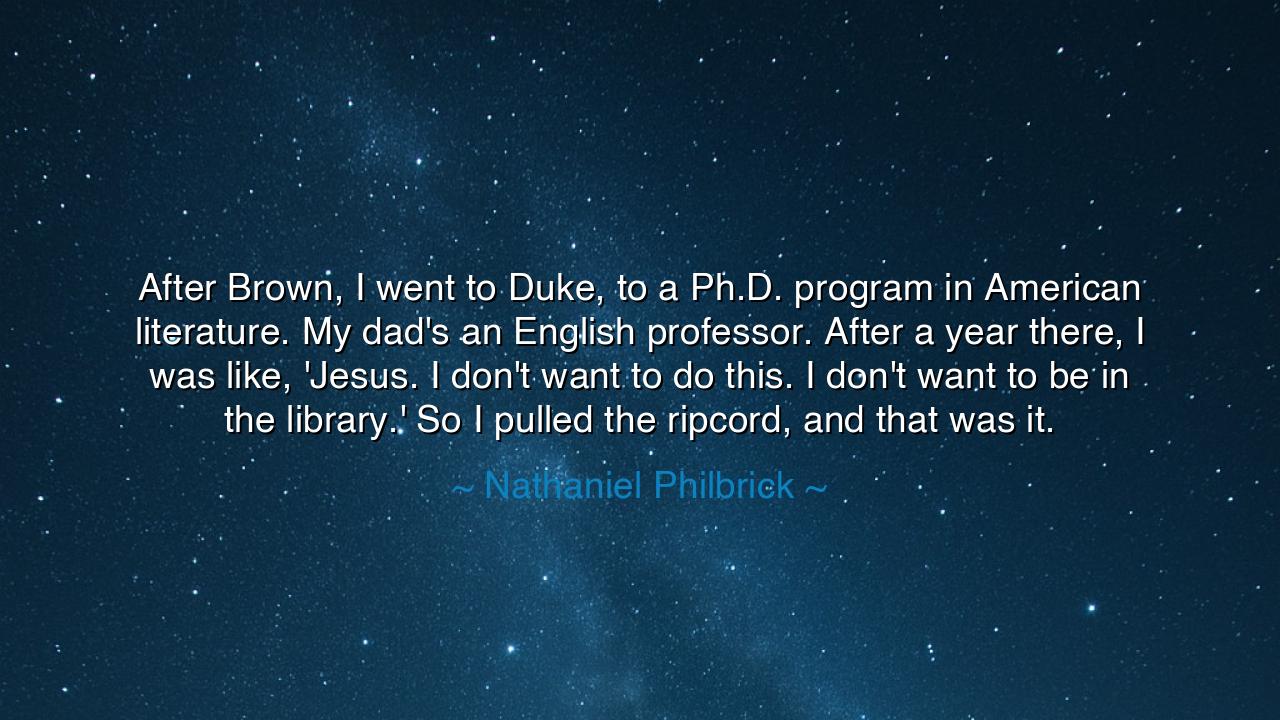
After Brown, I went to Duke, to a Ph.D. program in American
After Brown, I went to Duke, to a Ph.D. program in American literature. My dad's an English professor. After a year there, I was like, 'Jesus. I don't want to do this. I don't want to be in the library.' So I pulled the ripcord, and that was it.






Hearken, O seekers of wisdom, to the candid reflection of Nathaniel Philbrick, who recounts: “After Brown, I went to Duke, to a Ph.D. program in American literature. My dad's an English professor. After a year there, I was like, 'Jesus. I don't want to do this. I don't want to be in the library.' So I pulled the ripcord, and that was it.” In these words lies a meditation on self-discovery, courage, and the discipline of choice. Philbrick speaks not merely of academic pursuit, but of the profound necessity to recognize one’s true calling, even when it diverges from expectation, inheritance, or convention.
From the earliest ages, philosophers taught that a life unexamined, or one followed blindly from parental example, leads to stagnation of the spirit. Confucius admonished that virtue is found not in imitation, but in the alignment of one’s actions with one’s inner truth. Philbrick’s reflection embodies this timeless lesson: the courage to “pull the ripcord” is the act of listening to the soul, of acknowledging dissatisfaction before it calcifies into regret. To act in alignment with one’s authentic desire is to honor both self and potential.
Consider the story of Socrates, who, though the son of a stonemason, pursued philosophy instead of following his father’s trade. He resisted the expectations imposed by heritage and society, choosing instead to walk a path aligned with inquiry and truth. Like Philbrick, he recognized that fulfillment is not inherited but discovered through reflection and decisive action. The courage to diverge from tradition is not easy, but it is essential for the cultivation of a life of purpose.
Philbrick’s words also illuminate the tension between external expectation and internal calling. His father, an English professor, represented both guidance and implicit pressure toward a path in scholarship. Yet, through reflection and observation, Philbrick discerned the limits of his own desire. Here lies a lesson as ancient as the human spirit itself: true wisdom arises when one distinguishes between the roles imposed upon us and the vocation that calls from within.
History offers many examples of such courageous divergence. Consider Abraham Lincoln, who, though expected to labor in the family cabin, sought the law and public service. In listening to his own aspirations, he shaped a life of extraordinary consequence. Similarly, Philbrick’s choice to leave the library and chart a different course demonstrates that the act of acknowledging dissatisfaction and embracing change is foundational to a life of authenticity and achievement.
From this reflection emerges a timeless lesson: the path to fulfillment is rarely straight, and the courage to abandon a course that is not one’s own is itself a mark of wisdom. External markers of success — prestige, expectation, or inheritance — do not guarantee happiness, purpose, or impact. Philbrick teaches that clarity of self, combined with the courage to act upon it, forms the cornerstone of meaningful endeavor.
Practical counsel flows naturally from this wisdom: listen to your own inclinations with honesty, observe the dissonance between expectation and desire, and act decisively when the two conflict. Seek guidance, yes, but do not confuse inherited ambition with your own. In every field, in every life, one must cultivate discernment and courage, for the pursuit of authenticity outweighs the comfort of conformity.
Thus, O listener, let the words of Nathaniel Philbrick illuminate your journey: know when to continue and when to release. Pull the ripcord when the path no longer aligns with your soul. In doing so, you honor both your potential and your destiny, forging a life of purpose, integrity, and authentic fulfillment, and leaving a legacy shaped not by expectation, but by courage and self-knowledge.






AAdministratorAdministrator
Welcome, honored guests. Please leave a comment, we will respond soon